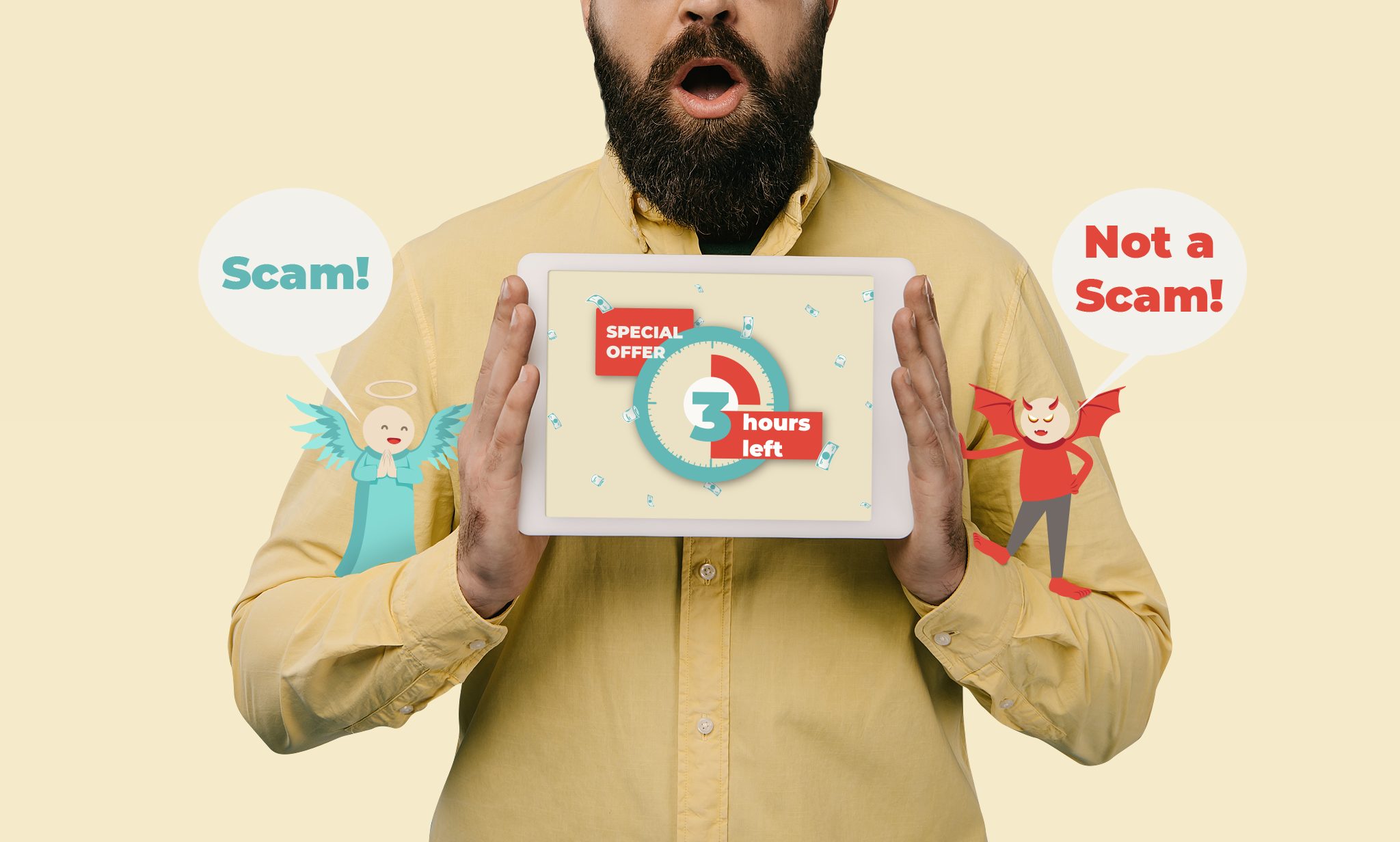With money, safety comes first! It is our responsibility as a trusted crypto exchange to help users protect themselves from crypto scammers. It can sometimes be difficult to identify scammers at first glance. So we encourage you to keep personal information secure by not trusting it to any potentially unreliable third parties.
Spotting scammers
Here are some of the red flags that may help you spot a scammer:
- It is too attractive. Scammers usually make offers that are too good to be true. So if someone promises you impressive gains and easy money, be especially careful.
- It is misleading. Money is always involved. You may be told that you have won some money, have a chance to get extra money but should send some amount in advance, or that your funds are in danger.
- They speculate on your privacy. You should also be wary if you get an email with an attachment. Reliable companies can send you special offers, but they would rarely ask you to open attached files.
- They are short on time. In most cases, scammers don’t have much time, so they try to instill a feeling of urgency. They want you to act as fast as possible.
- They try to scare you. Scammers often influence you through fear. They can tell you that something is wrong with your card, account, or computer to get valuable information.
- They are tricky. If someone contacts you out of the blue and asks for your personal information and payment details, it is most likely a scam.
Look for these red flags before agreeing to any offers. And if you are suspicious, then don’t give any information. This will significantly reduce your risk of falling prey to a scam. Let’s now see what you can do if you encounter a scam.
Tips on dealing with scammers
Here are some tips on how to avoid being scammed.
- Do not pay in advance. If someone promises you some gains or tells you that you have won something but should pay taxes or fees in advance, most likely they just want to take your money and disappear.
- Choose reliable payment methods. Your card has built-in fraud protection, while using Western Union or MoneyGram may be riskier. If you have any suspicions, don’t pay.
- If you receive a very attractive offer but you have doubts, take some time to think it over and talk to someone you trust. Scammers are almost always in a hurry; slowing down is a good way not to become a victim.
- Check the information by researching online to find out whether the offer is a scam. You can type in the company name or even a phone number to check if others have reported these people or organization as a scam.
- Trust only reliable resources with a proven reputation so that you can be confident about the information you are getting. Should you have any doubts about the sender, open the email and find the “Show original” or “View raw message” option. It is usually located in the “More” section in the form of three dots. You will be able to see the details of the actual sender and email sent in the window that opens.
Use these simple pieces of advice to make sure that your information and money do not fall into the hands of scammers.
How CEX.IO communicates with customers
As we care about the safety of your funds and information, we would like to remind you about our official communication channels and how we work.
Official communication channels
- CEX.IO website – https://cex.io/
- Official blog – https://a192dd6325a834ccda99579495ff9e06-2a31b0c30bd5e3b6.elb.eu-central-1.amazonaws.com
- CEX.IO Help Centre page – https://support.cex.io/hc/en-us
- Status page – https://status.cex.io/
- Official Twitter page – https://twitter.com/cex_io
- Official Facebook page – https://facebook.com/CEX.IO/
- Official LinkedIn page – https://linkedin.com/company/cex-io
- Official Instagram page – https://www.instagram.com/cexio_official/
You can fully trust the information provided via these channels. Still, note that even a single letter in a URL can be all that distinguishes an official resource from a scam. So we encourage you to be very attentive.
We also send you newsletters to inform about important changes. Please note that emails sent from CEX.IO always have an email address ending with @cex.io and never include attachments. If you receive a letter from an email address with anything other than @cex.io, please contact our support to clarify the situation. Should you have any doubts about the letters from CEX.IO, you can always contact us to check everything out.
CEX.IO customer support team principles
Last year, we started phone support for our registered users. You can easily find our phone number after you log in to your CEX.IO account. If someone tells you another CEX.IO support phone number, do not trust them.
Read through the rules we follow so you can identify CEX.IO-related scams.
- The CEX.IO Customer Support Team solves customers’ issues for free. If someone claims to work for CEX.IO and offers to help you for money, do not tell them anything about your account and do not pay them.
- CEX.IO doesn’t offer accelerated support or let users pay to jump the line.
- The CEX.IO Customer Support Team will never ask for your passwords or CVC codes. If someone claiming to be from CEX.IO tries to get such information, do not give it to them.
Always remember that you can easily contact the CEX.IO Customer Support Team via the form on our Help Centre or by phone. Our agents will do their best to answer your questions in the shortest time.
We are grateful for your understanding and loyalty.
